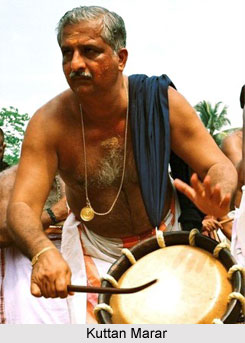 Peruvanam Kuttan Marar is the popular Chenda artist who has globalised the art of melam. There was a time not in the distant past when Kerala"s own collective percussion ensemble, the melam, was confined to the periphery of the temples. One man, hugely responsible for popularising it into a dominant form of artistic expression is Peruvanam Kuttan Marar.
Peruvanam Kuttan Marar is the popular Chenda artist who has globalised the art of melam. There was a time not in the distant past when Kerala"s own collective percussion ensemble, the melam, was confined to the periphery of the temples. One man, hugely responsible for popularising it into a dominant form of artistic expression is Peruvanam Kuttan Marar.
The biggest challenge this art form faced in the past was its inability to rope in youngsters. It was never considered a potential career which would give the artiste a steady income. Even the best of them went unrecognised, it was reduced to being a sort of family tradition, and some of those who were into it took up other professions, while some were driven to suicide.
Early life of Peruvanam Kuttan Marar
Peruvanam Kuttan Marar was born to a family of chenda artists in Peruvanam, Thrissur, Kerala. His grandfather, late Peruvanam Narayana Marar and his father, Late Peruvanam Appu Marar were also well known chenda artists. His teachers include his father, Peruvanam Appu Marar, Kumarapuram Appu Marar and Sreenarayanapuram Appu Marar. He made his debut with Chenda at the age of 10. He performed at festivals in nearby temples including Peruvanam Mahadeva Temple. He also joined as a teacher in a nearby school at the age of 20.
Career of Peruvanam Kuttan Marar
Kuttan Marar is seen to be a part of popular festivals of Kerala including Thrissur Pooram, Peruvanam pooram, Kollam Pooram and those at Guruvayur Temple. He leads the famous Ilanjithara Melam of Thrissur Pooram. Kuttan Marar started performing at the Ilanjithara Melam from 1977 and has been its Pramani since 1999.
Kuttan Marar and others of his generation turned this ?gap? i.e. the detachment of the artists with their art to their advantage. ?People began to look at us with hope. There was a renewed demand for the art, we began to get recognised and even demand our remuneration.?
The melam itself is a wonder. Artistes get together, some of them meeting for the first time or after a long interval, without rehearsal, with no conductor, no notations, simply following a leader?s definite signs or gestures to create a spontaneous musical explosion. A ?pramani? (leader) of the ensemble calls for individual virtuosity, man management skills and the ability to lead the group without deviating from the traditional structure of the melam. It is he who controls the measure, speed of time, the whole performance. Kuttan Marar has been the leader in some of the most important melam venues for more than three decades now.
When he was barely 28, Peruvanam Kuttan Marar was invited to be the Pramani ? the conductor of the large rhythm ensemble, for the first time, both at the festivals at the Guruvayoor Temple and at the Chathakudam Sastha Temple. There are not many artists in the history of rhythm music in Kerala, who were assigned this difficult role of controlling an ensemble of over 150 artists of a 100 year old classical tradition, at such a young age. From then on, for the last 41 years, Kuttan Marar?s name is synonymous with the development of rhythm music in Kerala. He leads the rhythm ensembles in nearly 84 temple festivals on a permanent basis. Also, he is the conductor for over 300 Melams every year!
One of the recipients of the Padmashri Awards in 2011, Kuttan Marar considers this a huge responsibility and recognition for his art. ?I?m not an experimenter, or a teacher. I?m just one who is trying hard to preserve what has been handed over to me by the masters. All the awards have been recognition for the chenda not for my personal performance. It is for teamwork. I accept every honour on behalf of my team,? says Kuttan Marar as he straps the chenda on his shoulder and moves to join his team for another few hours of mesmerising music.




















